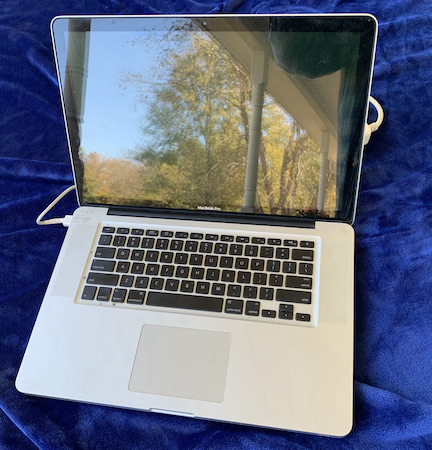
System Built using a Macintosh Laptop @Mac_Laptop_Sys
Earlier Systems
A Tour of Computer Systems We Built
Jump to Macintosh Laptop System
Jump to BeagleBone Computer System
Jump to First Raspberry Pi 3 B Computer System
Jump to Raspberry Pi 3 Computer System with Digital Joystick Keyboard
Jump to Raspberry Pi 3 Computer with Analog Joystick Keyboard
Jump to The Honeycomb Computer System with Braille Keyboard
Jump to The Emerald Computer System Using a Pi Zero
Looking back, I had forgotten how many systems we have built. These systems helped form my vision on how to move forward. Below is a very quick tour.
Below is a picture of the first system using a Mac Book Pro. Images were analyzed and were converted to musical notes to indicate the Hue, Saturation, and Value of the color. It was a nice demonistration, but I can't see a blind peron walking to the store while tying on a laptop.

System Built using a Macintosh Laptop @Mac_Laptop_Sys
The next system used the iPad shown below. Tis a smaller system, and we had some things working. Then we read Apple was considering discontinuing the software we were using. Raising the possibility that blind people all over the world are using this system, and all of a sudden, everything goes dead. I like the iPad, I like Apple, but this is not the right application for a iPad.
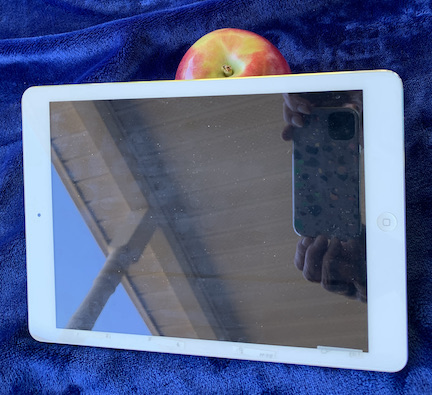
The iPad Computer System @iPad_Sys
The next system below uses a BeagleBone Black computer. It is a credit card sized computer that has inputs for sensors and can generate audio. As a package, I grabbed a plastic box used for displaying baseballs, a screwdriver, and two clamps used to provide hermetic seals in electrical boxes. -- You do not want to mess with someone holding this particular screw driver. -- It was difficult for the BeagleBone computer to keep up with the requisite computations. I tweeked and rewrote and cut until it just worked. In the first demo it just sputtered and again could not keep up. I was so deflated, I was ready to quit. Then someone suggested the Raspberry Pi 3 B+ computer.
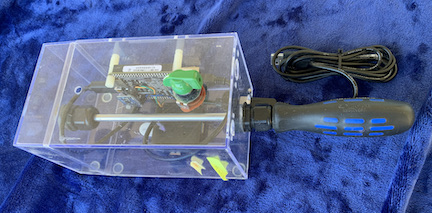
The BeagleBone Computer System @BeagleBone_Sys
The first Rapberry Pi 3 B+ system is shown below. It's called the Pineapple System, because the handle is made out of a pineapple cutter. This is a surprisingly comfortable handle. This computer is powerful, and it mannaged to handle all of the calculations required.
You can see the camera mounted on the front. Images are captured, the average color of the very center of the image is calculated, and that is converted to musical notes which represent a color. Yes, I know, there is so much more that can be done.
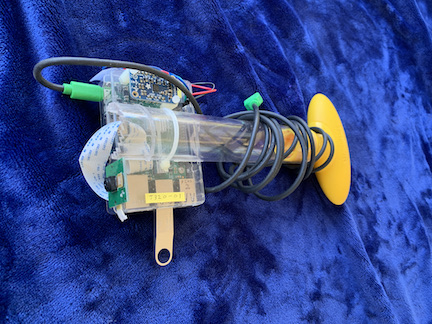
The Raspberry Pi 3 B Computer System @Pi_3B_Sys
The next system below had an important innovation. A keyboard was built into the handle. Two joysticks, one on top (shown) and one on the bottom can be manipulated with the thumb and index finger. These digital joysticks have six states: right, left, forward, back, down, and not pushed. Using this simple system the whole alphabet and a number of special characters can be typed. The details are too complicated to be discussed here.
Unfortnately, these joysticks were unreliable for sustained use. The Thor computer system discussed later used analog joysticks instead of switches. The analog joysticks had problems with the zero wandering, which also made readings very difficult. I like both of these systems, they are small, convient, and can express a large alphabet. However better joysticks are needed.
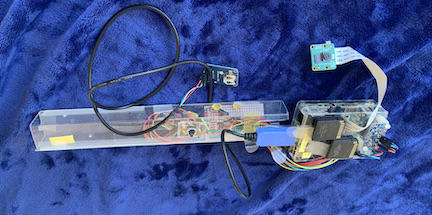
Pi 3 Computer System with Digital Joystick Keyboard @Pi_3B_Sys_Dig
The next picture shows the Thor computer system. It is more robust than the last and uses analog joysticks. Some of the analog electronics for the joysticks are shown on the front left face of the system. On top of the handle is one of the analog joysticks, the blue battery can be seen to the right in the handle, and some of the mass of wires that connect everything can be seen to the left. A nice feature is the built in GPS system. The GPS works surprisingly well, and I think would be quite useful for navigation.
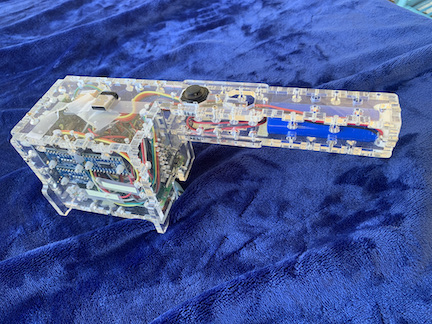
Raspberry Pi 3 Computer System @Pi_3B_Sys_Analog_1
A front view of this Thor system is shown below. On the front face is an 8 Megapixel video camera, an IR sensor to find hot and cold objects, a color sensor for matching clothing, and a time of flight distance sensor. The "Thor Hammer" has a large head, which as you can see, is jam packed full of things. Worse, the little pin plug connections that were used, tend to be unreliable. When something breaks, this complex system needs to be taken apart, repaired, and reassembled. I have fixed this system, only to find when it is reassembled, another pin has gone fritz. Everything needs to be soldered, and much smaller.
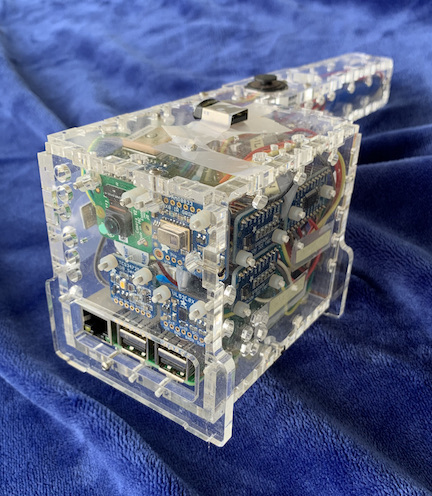
A Second View of the Thor Computer System @Pi_3B_Sys_Analog_2
The Thor package was laser machined, enabling high accuracy and the ablity to mount or put a hole anywhere desired. For strength the edges were interlocked and screwed together. Several packages in the process of being assembled are shown below.
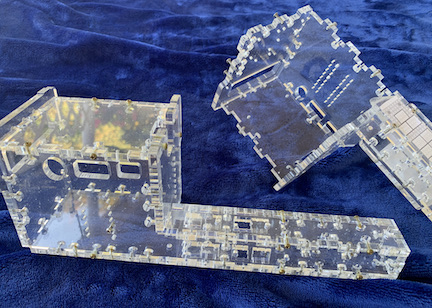
The Thor Computer Package Being Assembled @Pi_3B_Sys_Analog_3
The HoneyComb computer system below began with an inspiration and observation. I modeled it in paper, and by gosh, everything fit.
On the front left is a Braille 3 keyboard (more on this sometime). One's hands just nicely fit around the warm computer while typing, quite a comforting feeling. A Pi 3 B+ and the battery fit inside, and there is a mother board on the bottom eliminating much of the wiring.
This is my favorite computer of all times. I love it. I want one on my desk. But this will have to wait. A smaller, lighter computer needs to be developed for the blind first.
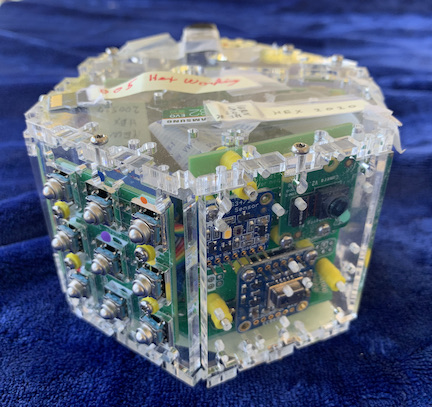
The HoneyComb Computer System with Braille Keyboard
The Emerald system shown below is the last computer system we developed. It is much smaller and almost everything is on printed circuit boards, eliminating much hand wiring. I would absolutelly love some help developing the next version of this system. More details can be found on the BiiBoards.com main web page under the Emerald page.
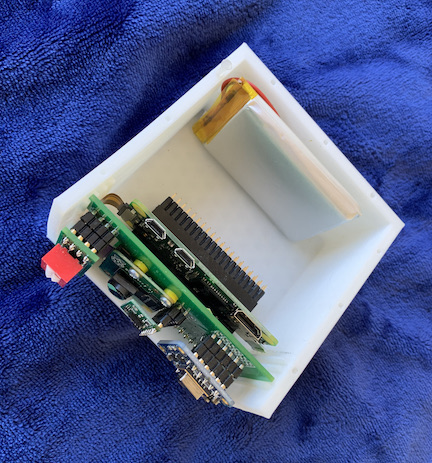
The Much Smaller Emerald Computer System Using a Pi Zero @Emeral_Sys_Zero
Thank you for your interest.
William Trimmer